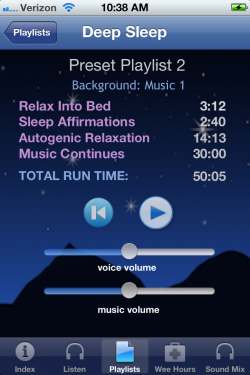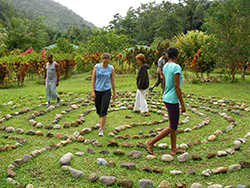 Will meditation help me sleep? I'm falling asleep during meditation, am I doing something wrong? Is it OK to meditate at bedtime?
"It depends..." is often the answer to these common questions. It depends on what kind of meditation you are doing. It depends on your unique nervous system and physiology. It depends on why you are meditating in the first place, what your goal is. That being said, I'll share a few thoughts on these questions from the perspective of our meditation style.
Will meditation help me sleep? I'm falling asleep during meditation, am I doing something wrong? Is it OK to meditate at bedtime?
"It depends..." is often the answer to these common questions. It depends on what kind of meditation you are doing. It depends on your unique nervous system and physiology. It depends on why you are meditating in the first place, what your goal is. That being said, I'll share a few thoughts on these questions from the perspective of our meditation style.
Will meditation help me sleep? Our approach is above all to promote naturalness and ease in living. We're all about trust -- trust in life, trust in oneself. Ultimately, it's about relaxation -- letting go of the tension that comes when we try too hard, resist what is happening, or are in conflict with ourselves. It's about relaxing into the flow of life and living. This approach to meditation, or any other meditation style that promotes deep relaxation, should certainly improve the quality of sleep. Sleep comes about as we relax and let go of the concerns of the day.
I'm falling asleep during meditation, am I doing something wrong? In the deep relaxation of meditation, the body takes what it needs. If you are not getting enough sleep, the body will naturally fall asleep. So many of us are not getting enough rest, so when sleep comes in meditation it's a blessing, even if it's an unplanned afternoon nap! Practicing meditation in the style we teach should lead to greater alertness and clarity. But that doesn't mean we have to be alert and clear during meditation. (After all, we are not alert and clear during sleep, but a good night's sleep results in greater clarity and alertness during the day.) If you were totally rested, your experience during meditation would probably be one of enhanced wakefulness and energy, but if that isn't what is happening, that's fine. Whatever happens is what needs to happen at the time. So we recommend not resisting sleep when it comes. The sleep you get in meditation will be particularly deep and refreshing to the system.
Is it OK to meditate at bedtime? There is no hard and fast rule about this. If meditation makes you more alert and energized, you wouldn't want to meditate right before bed. If meditation is mainly relaxing and you slip easily into sleep while meditating, then by all means meditate before bed. The ideal would be to have another meditation earlier in the day as well. Sitting up and meditating during the day will make it more likely you'll stay awake, and different benefits can be derived from that. If you can do it, make twice daily meditation part of your routine!
On guided meditation. As those of you know who listen to our podcast meditations or use our apps, guided meditations guide you in meditation. They can be designed to simply help you achieve a meditative state, or they can have a specific focus and take you on a journey with a particular theme. We have both kinds of meditations. Some will be conducive to falling asleep, while others will be more stimulating and may not work well right before bed. You will need to try the different meditations to see what works for you.
 Our new iSleep Easy app. The guided meditations on our new app are specifically designed for bedtime, and one is even designed for when you wake up in the middle of the night. All of the meditations are designed to help you let go and relax, much like our other meditations, but they are more focused on falling asleep and promoting a sound sleep. The app also gives you the ability to create a Playlist with several meditations in a row. Currently the app is available on iPhone -- you can read about it in the iTunes store. If you get the app, let us know how it works for you!
Our new iSleep Easy app. The guided meditations on our new app are specifically designed for bedtime, and one is even designed for when you wake up in the middle of the night. All of the meditations are designed to help you let go and relax, much like our other meditations, but they are more focused on falling asleep and promoting a sound sleep. The app also gives you the ability to create a Playlist with several meditations in a row. Currently the app is available on iPhone -- you can read about it in the iTunes store. If you get the app, let us know how it works for you!





